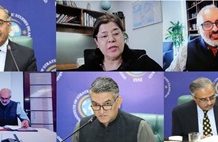To employ an external agency to promote spiritual and religious matters, especially when the agency is a modern state with the most coercive elements at its disposal, could turn it into an oppressive and totalitarian entity
The question of where religion should be situated in state and society in this modern age raises troublesome controversies in the Muslim countries. During the age of empires, however, this issue had largely been settled. Consider.
Muslim empires worked on the basis of the principle of two spheres, one of religion and the other of the secular Muslim rulers. The two spheres operated mostly independent of each other and understood well their limits and jurisdictional boundaries. Each accorded respect to the other. The Muslim jurists placed only two limitations on the Muslim ruler: he should be just and he must not enact rules against the well-recognised streams of Islamic law.
This principle allowed the Muslim societies to achieve a great degree of balance and the equation between the spiritual and temporal worlds worked to the benefit of both. The secular ruler got the allegiance (political legitimacy) while the ulema and their religious networks enjoyed the autonomy and freedom to educate the masses and spread the world of God without any hindrance from the emperor.
Western imperialism heralded the arrival of the modern age. Social responses to western domination were shaped largely by the ideology of nationalism and later defined by alternative approaches to the reconstruction of a national state and a search for its ideological identity. This political and intellectual activity brought the religion back into the political discourse of Muslim societies.
The rise of political Islam is not entirely a new phenomenon, as is generally misunderstood. It began with an internal intellectual inquiry in the religious circles of the Muslim societies in the subcontinent and the Middle East when independence appeared on the horizon. This was also a time when competing ideologies, old and new, began to demonstrate greater influence than during the last century. For Muslims it was a defining moment in terms of choosing an ideological direction with powerful pulls of socialism, democracy and capitalism. Undoubtedly, these three streams of ideology were part of the modern world and along with secular ideas had impacted certain sections of the Muslim societies.
The Islamic thinkers, scholars and activists that founded the Ikhwan ul Muslimoon in the Middle East and Jama’at-e Islami in India, as also others in their individual capacity, began to conceive of Islam as an alternative ideology to order social, economic and political life in the post-colonial state. They were impressed by the appeal of ideology in their times, and more importantly by the organisational style, methods of recruitment, indoctrination and discipline of Fascist and Communist parties of Europe. The Ikhwan and the Jama’at and other religious parties in the Muslim world have followed similar patterns of recruiting, training and developing their cadres. The central theme of all religio-political parties has been, and is likely to be in the coming decades, that Muslim societies, corrupted by the colonial rule, western influences, and now increasingly by the onslaught of cultural globalisation, need to be Islamised through the agency of the state.
This is where they would like to situate the religion. This is also what defines political Islam in our time.
The quest and the struggle of the Islamists is centred around the notion that they must first capture the state and then use its expansive, coercive power to implement the Islamic law, promote virtue and stamp out vice. Mass mobilisation, political pressure and threat of agitation are secondary options to be exercised for the implementation of the Islamic law when they are not in power. Over time, these parties have acquired critical political mass through various strategies of public-welfare and grassroots organisational work, reaching out to professional groups and building coalitions with right-of-centre parties.
The second passage last week of the Hasba Bill by the Frontier Assembly, dominated by the six-party religious alliance, Mutahidda Majlis-e-Amal, and Hudood Laws implemented during the military regime of General Zia-ul Haq are reflective of the top-down Islamisation approach of the religious parties. This is also the most preferred route of religio-political parties throughout the Islamic world.
Acquiring or accessing political power is a very important goal of all political parties, and religious parties are no exception. The only difference is that they justify their quest for power with reference to Islam, Islamisation programmes, and creating an Islamic society in their image of virtue and righteousness. They make a similar appeal to the society, as would any ideological political party.
In this struggle and appeal, the religious parties have done well in presenting a coherent and persistent, although a simplistic critique of many failures of the post-colonial state governed by the corrupt elites. They present Islam and themselves as better alternatives to the ills of the modern nation-state. In doing so, they have carved up a good constituency of support among the lower middle classes.
However, while recognising the right of religious parties to compete for power freely within the limits of law and constitution, they cannot be allowed to go unchallenged on the question of placing religion in the domain of the state. It is clear that the religious leaders have failed to understand the evolution, nature and meanings and objectives of the nation-state. Modern states are essentially coercive institutions and maintain order among conflicting interests and groups. But the maintenance of order must be intended to promote and protect public interest and the good of society. State is at its best when it is non-intrusive and leaves the society and individual with greater freedoms and responsibilities.
Religion is essentially a very private matter between man and his creator. To employ an external agency to promote spiritual and religious matters, especially when the agency is a modern state with the most coercive elements at its disposal, could turn it into an oppressive and totalitarian entity. Imbued with the spirit of authenticity, certitude and a mission, the religion-based political authority would turn intolerant. There is ample evidence of this from the experience of religious and ideological states of medieval and modern times. Repeating the same mistakes will really do us no good at all, further weaken our religious unity, and sap our collective energies which we should instead be directing towards eradicating poverty, illiteracy and underdevelopment and other social-development projects. The MMA in the Frontier has nothing to show on these counts and is now turning to its favourite non-issue of religious accountability.
Political Islam, which declares the separation of state and religion as heretical, is flawed in its attempt to employ the device of the state to enforce religious values. Religion belongs to the individual and to the community and is primarily a voluntary act. It is impossible for the Hasba Bill to make individuals pious, righteous or even good human beings.
The author is a professor of Political Science at the Lahore University of Management Sciences












